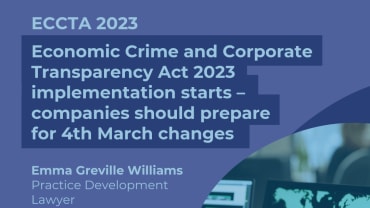We recently published a blog highlighting that many start-ups and early stage technology companies were not eligible for the UK Government's existing COVID-19 loan scheme initiatives. In order to fill that gap the UK Government has announced the availability of £250 million of convertible loan funding to support these innovative companies through the Future Fund. It is expected that the fund will be launched in May 2020. We have set out a summary of the fund and the key terms based on the information available to date, however details may change for launch.
Which businesses are eligible for funding?
The Future Fund is available to unlisted UK registered companies which:
- have a substantive economic presence in the United Kingdom (the 'substantive' test being a test to confirm that the primary location of the company's operations is the UK, rather than an assessment of the size of the company)
- can attract enough funding from third-party investors to match the amount from the Future Fund (it is not clear at this stage if the matched funding must also be by way of a convertible loan, but the guidance suggests that the Future Fund and matched investors would be going in on the same terms)
- have raised a total of at least £250,000 in equity investment from private third-party investors over the last five years
Where a company is a member of a corporate group, only the parent company (provided that it meets the above criteria) will be eligible to receive the loan. This means that companies with a non-UK parent will not be eligible for funding.
What funding is available?
The Future Fund will provide up to £250 million of funding into UK start-ups meeting the above eligibility criteria by way of co-investment (i.e. funding from the Future Fund will need to be matched by private investors).
Companies will be able to apply for convertible loans ranging from £125,000 to £5 million. There is no maximum amount of funding which can be made by private investors. But £5 million is the maximum amount which will be matched by the Future Fund.
The scheme will be administered in partnership with the British Business Bank.
What can the funding be used for?
The funding (including the matched funding) must be used solely for working capital purposes. The funding (including the matched funding) must not be used for repayment of third party borrowing, payment of dividends or bonus payments to staff, management, shareholders or consultants. In addition, the funding from the Future Fund cannot be used for advisor or placement fees (or bonuses to external advisors).
It is not clear if businesses receiving funding through the Coronavirus Job Retention Scheme will be prohibited from using the Government and matched funding for payment of employee wages.
Can the Future Fund match fund a round which has recently closed?
The Government is not proposing to match private funding of previously closed rounds. If a business wants to benefit from the Future Fund then it will need to seek further private investment.
If a business is close to completing a funding round, and wishes to apply for the matched funding, they may want to delay closing until the scheme opens.
Is the funding repayable?
Any repayment of the loan to the Future Fund shall be at the discretion of the government. Interest shall accrue on the loan at a rate of 8% per annum payable on maturity of the loan (unless a higher amount is agreed with the matching investor). But it is expected that the government will convert its loan into shares prior to any repayment date, which will be a maximum of 36 months from the date of closing. The funding will automatically convert to shares on a qualifying funding round (being a round which raises an amount at least equal to the government and matched funding). Such conversion will be at a 20% discount to the price set by that funding round. The company will then be entitled to choose whether to repay the accrued interest or allow it to convert (any interest would convert at the full price of the round).
Conversion of the funding will be at the option of the majority of the matched investors in the event of an unqualified funding (i.e. a funding round which raises less than the amount of the government and matched funding). The investors shall also have the option to convert in the event of a sale or an IPO, if such conversion would provide a higher return than repayment.
If the government and the matching investors elect for the loan to be repaid at the date of maturity, or on a sale or IPO, the amount to be repaid will be the full amount of funding, plus a 100% premium (i.e. double the amount of the original funding).
What investor rights will the Future Fund require?
As an investor, it is expected that the Future Fund will require:
- the loan to convert into the most senior class of shares in the company (i.e. they will rank first in any capital distribution) and if there is a funding round in the first six months from the date of conversion then the Future Fund will be entitled to convert its shares into any further senior class of shares issued at such fundraising
- limited corporate governance rights typical of a loan noteholder during the term of the loan and limited corporate governance rights typical of a shareholder following conversion of the loan, for example, consent rights or vetoes on decisions which would have a material impact on the Future Fund's investment, such as a proposed wind-up of the company
- limited warranties to be given by the company at closing of the loan (it is not clear if the Future Fund will also expect warranties to be given by the founders/executives), these will include warranties in respect of title and ownership, capacity, compliance, borrowing, litigation and insolvency
- the company to undertake that the Future Fund will be treated equally alongside other investors and, in particular, will require the same information rights
- a negative pledge preventing the creation of any indebtedness which is senior to the loan from the Future Fund, unless such indebtedness is from a genuine third party that is not an existing shareholder or investor
- if further convertible loan notes are issued on more favourable terms, a right for the terms of the funding (including matched funding) to be amended so that such favourable terms also apply to the convertible loans held by the Future Fund and the matched investors
Can the government transfer its interests?
The Future Fund will have the right to transfer the loan or, following any conversion of the loan, any of its shares to:
any other government departments or wholly owned government entities
an institutional investor acquiring a portfolio of ten or more investments in companies held by the Future Fund
How can Brodies help?
Our corporate colleagues regularly advise on deals of this type and would be happy to assist if you are considering making an application for assistance from the Future Fund, or if you are a private investor looking to match fund.
If you have any questions about this or any other matter relating to the impact of COVID-19 on your business, please get in touch with any member of the corporate team or your usual Brodies contact.














